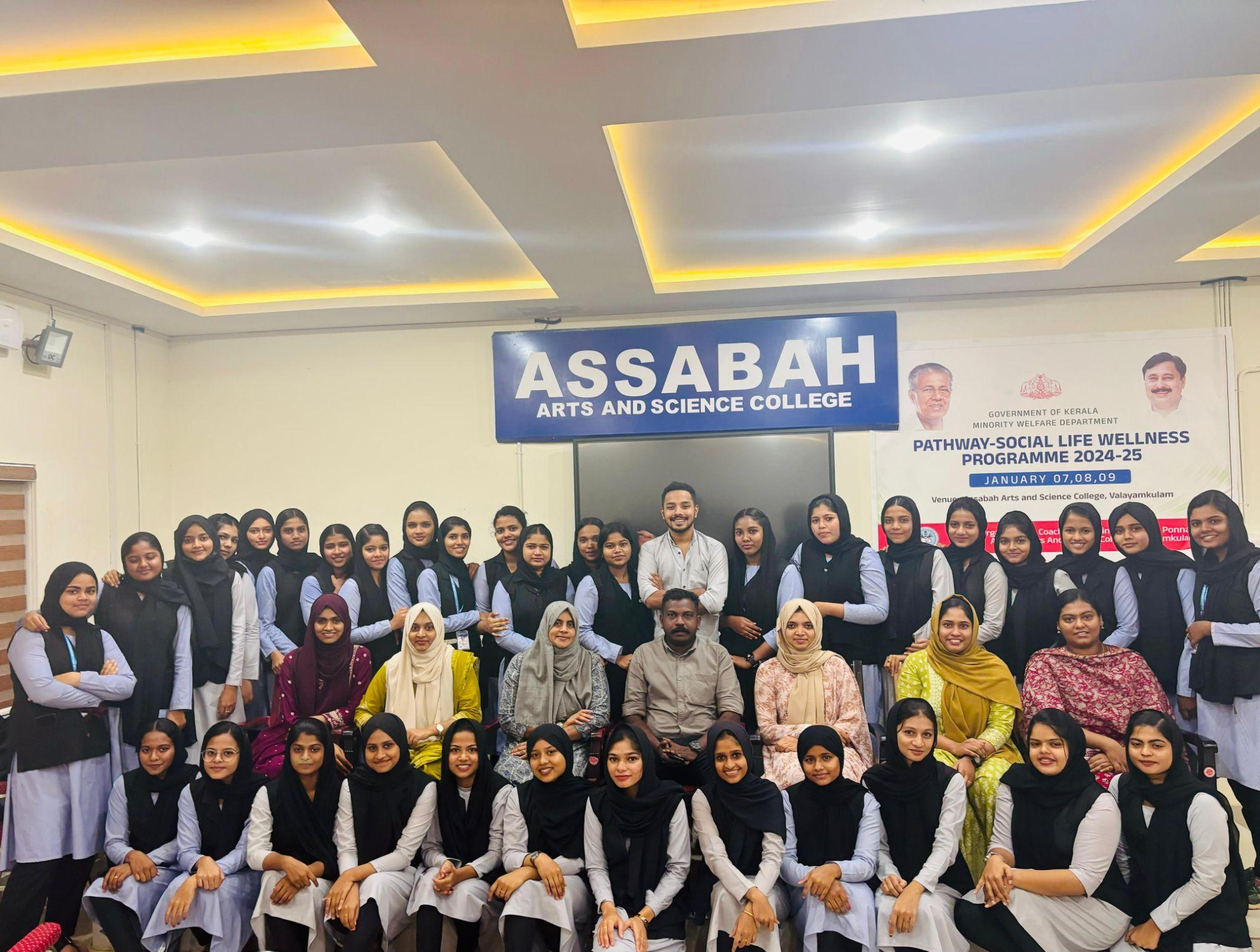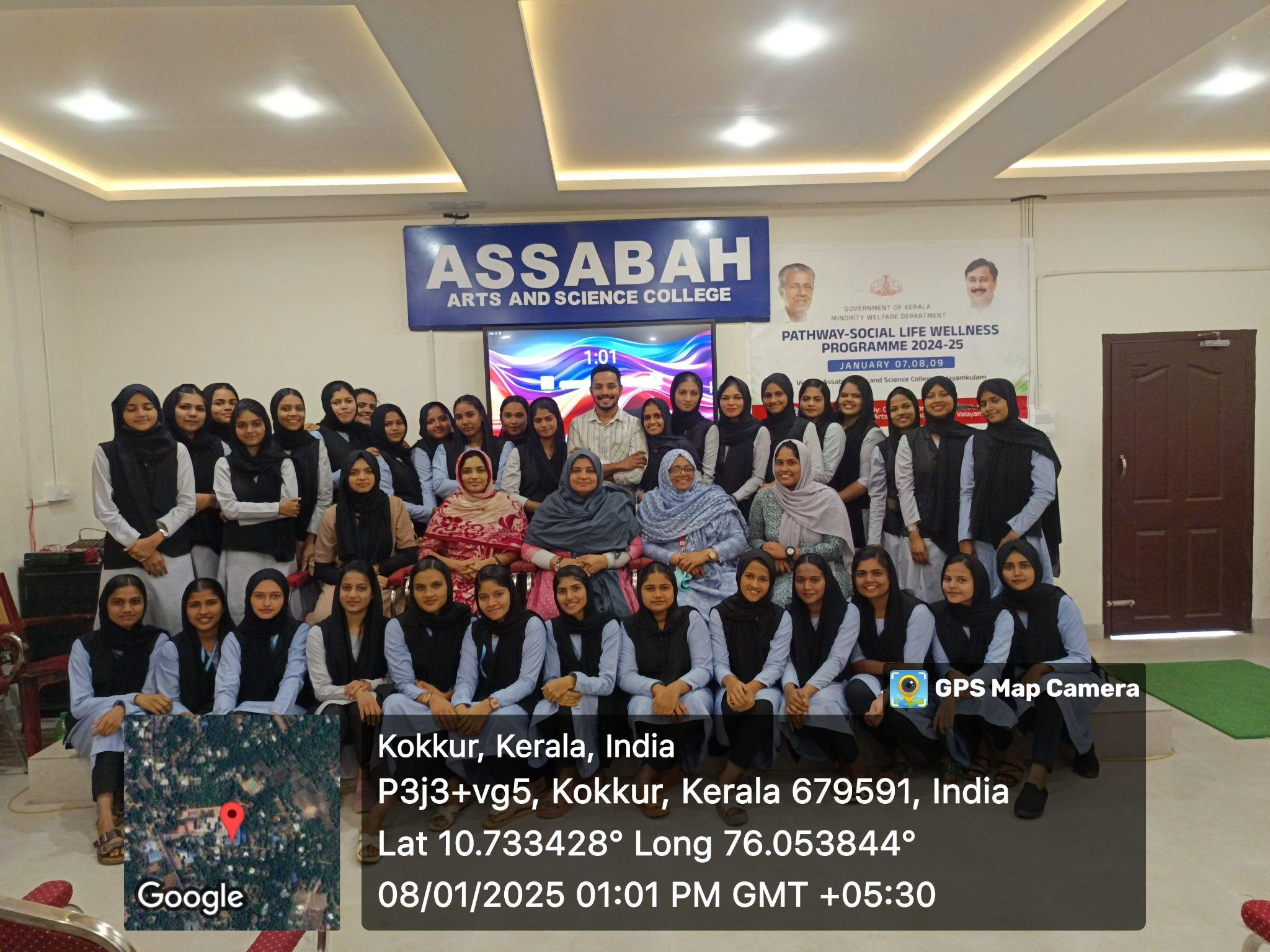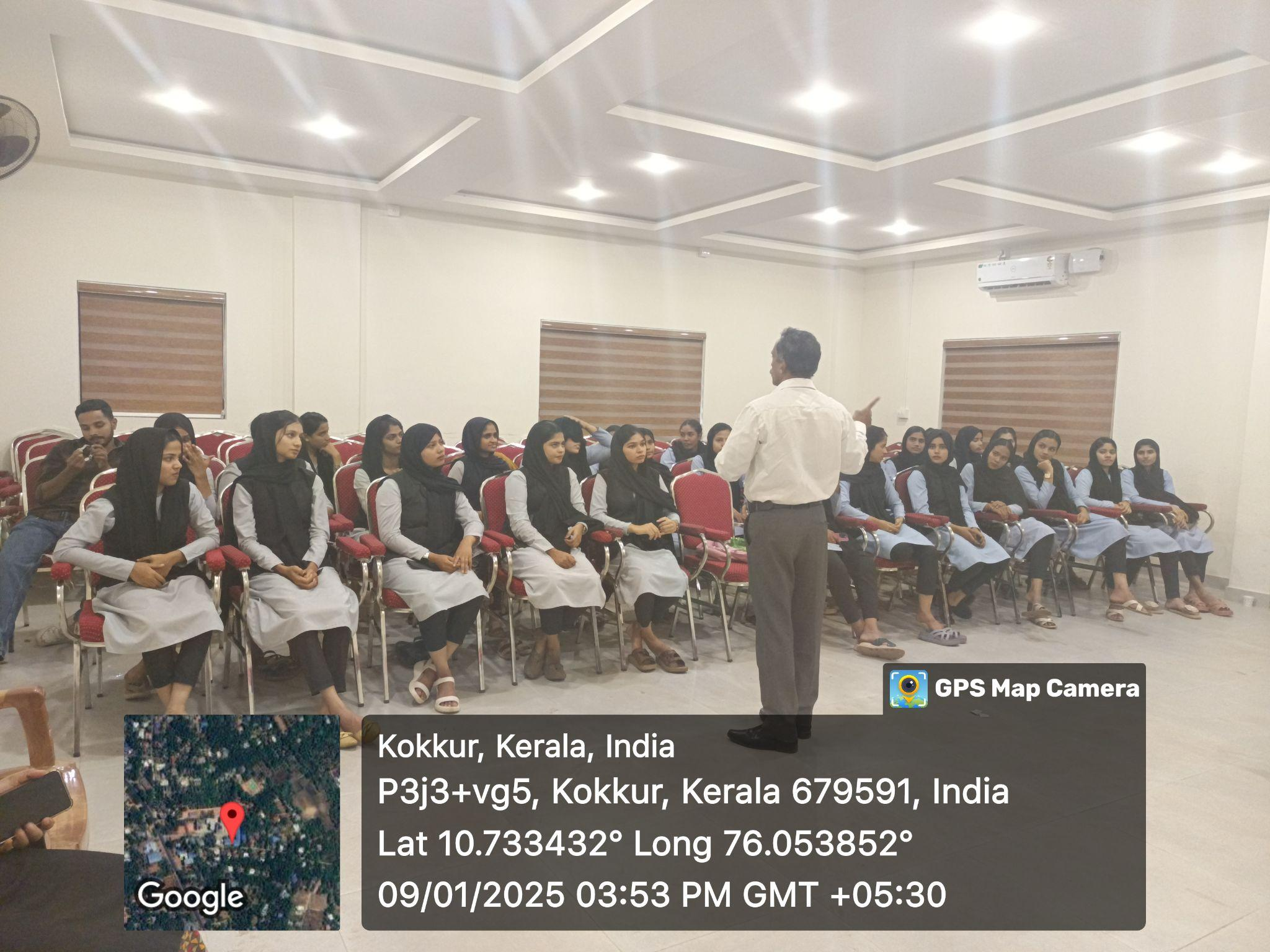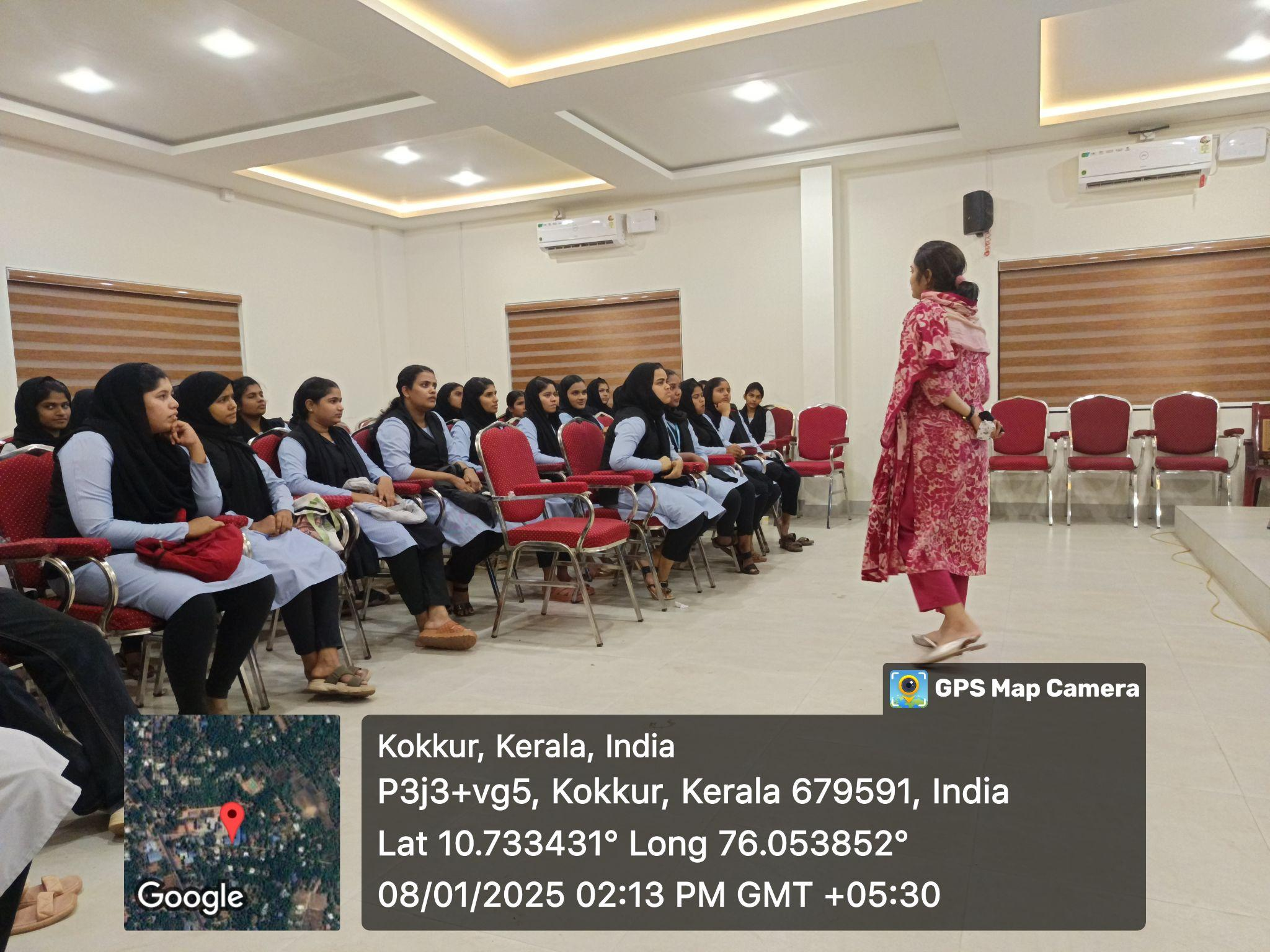PATHWAY SOCIAL LIFE WELLNESS PROGRAM
The Department of Psychology and Mental Health Club in ASSABAH Arts and Science College, Valayamkulam has conducted the third batch of three day Pathway Social Life Wellness Program for minority youth on January 07,08 & 09 at college conference hall.
07/01/2025
9.30-10.00 AM
Kerala Government- Minority Affairs Department Project Pathway Social Life Wellness Program,three-day camp was inaugurated by PPM Ashraf (President, ASSABAH Trust).
Ponnani Coaching Center for Minority Youth Principal Mr. Sarath Chandra Babu delivered the keynote address.
College Principal Prof. M N.Mohamed Koya presided the function, Head of the Department of Psychology Mrs. Harsheena. E A welcomed. Assabah College General Secretary Muhammed Unni Haji, College NSS Coordinator Mr. Abdul Rahman and College union chairperson Mr. Muhammed Suhail expressed felicitation. Pathway coordinator Ms. Anshifa. T (Consultant Psychologist) expressed a vote of thanks.
Day-1 (07/01/2025)
Session-1 (10.00 AM- 1.00AM)
Mrs. Sabira V led the session on Introduction, marriage for social wellness.
Session explained various matters like Marriage as a Social Institution, Promotes Social Wellness, Family and Child-Rearing, Economic Benefits, Community and Social Connections, Health Benefits and Potential Challenges. It provided a foundation for family life, which is essential for social order and well-being. The program covered the topic of how marriage lowers the risk of social isolation by fostering companionship and emotional support and how marriage promotes social wellbeing, while many societal, cultural, and personal factors can affect its effects.
Session-2 (2.00 PM- 5.00 PM)
Mrs. Jumana Thasneem K P led the session on Effective communication skills for couples and healthy online communications.
The session highlighted the importance of effective communication in relationships, both offline and online. It stressed that active listening and clearly expressing feelings are foundational to ensuring both partners feel heard and understood. Non-verbal cues, such as body language and tone, further strengthen emotional connections by conveying meaning beyond words. Empathy and validation were noted as essential for building trust, as they ensure that partners’ feelings are understood and respected. The session also highlighted the significance of conflict resolution skills in managing disagreements constructively, promoting a healthier relationship dynamic. In the context of online communication, the session emphasized the need to maintain respect, set boundaries, and be clear in messaging to avoid misunderstandings. Lastly, it was noted that balancing online interactions with in-person communication is crucial for maintaining emotional closeness and safeguarding privacy and security.
Day-2
Session-1 (10.00 AM- 1.00AM)
Mrs. Muneera. K led the session on Effective management in law relationships and conflict resolution techniques.
The session highlighted that effective management in relationships, especially in legal contexts, requires clear communication, mutual respect, and an understanding of each party's rights and responsibilities. It covered how conflict resolution techniques like active listening, mediation, and finding common ground can address disagreements constructively. Additionally, the session emphasized the importance of setting clear boundaries, maintaining professionalism, and focusing on solutions rather than assigning blame. These strategies help preserve relationships and ensure that legal matters are handled fairly and amicably, minimizing stress and hostility.
Session-2 (2.00 PM- 5.00 PM)
Dr. Jaliba Shirin A P led the session on Infant and Adolescent, parenting skills, sex education and pregnancy.
The session highlighted that effective parenting for both infants and adolescents requires understanding their developmental needs, offering emotional support, and setting clear boundaries. For infants, it covered the importance of providing a nurturing environment to foster growth, while parenting adolescents involves open communication, guidance, and encouraging independence. The session also emphasized the role of sex education in informing both adolescents and parents about sexual health, consent, and responsible decision-making. It highlighted how this education empowers young individuals to make informed choices, while pregnancy education ensures a thorough understanding of the physical, emotional, and social aspects of pregnancy, preparing parents for the associated responsibilities and challenges.
Day-3
Session-1 (10.00 AM- 1.00AM)
Mrs. Suharabi P led the session on Family budgeting.
The session highlighted that family budgeting involves managing household finances by planning income and expenses to ensure financial stability. It covered the importance of tracking all sources of income and prioritizing essential expenses, such as housing, utilities, and food, while also setting aside funds for savings and discretionary spending. The session emphasized that effective budgeting helps families control spending, avoid debt, and prepare for emergencies or future goals. It also highlighted how regularly reviewing and adjusting the budget enables families to stay on track and make informed financial decisions, ultimately promoting long-term financial well-being.
Session-2 (2.00 PM- 5.00 PM)
Adv. P Hamzakutty led the session on Legal and religious aspects of marriage.
The session highlighted that the legal and religious aspects of marriage involve distinct yet often complementary frameworks. Legally, marriage is a formal contract recognized by the state, with rights and responsibilities regarding property, inheritance, and family matters. The session covered that legal requirements typically include consent, age, and registration. Religiously, marriage is viewed as a sacred bond with spiritual significance, governed by the teachings and traditions of specific faiths. The session emphasized that religious ceremonies and rituals may vary, but marriage generally represents a commitment before God, often accompanied by moral and ethical expectations for the couple’s relationship. Both legal and religious perspectives, as the session highlighted, stress commitment, stability, and mutual responsibility within marriage.
Total 35 students attended the program and received the best feedback from the participants.
We have distributed pen and writing materials(notepads) to the participants and also provided lunch, tea and snacks in each session.
At the end of the course Principal Prof. M N Mohamed Koya, Mrs. Harsheena E A (HOD, Psychology), Ms. Anshifa. T ( Program coordinator) distributed the certificates to all participants.



